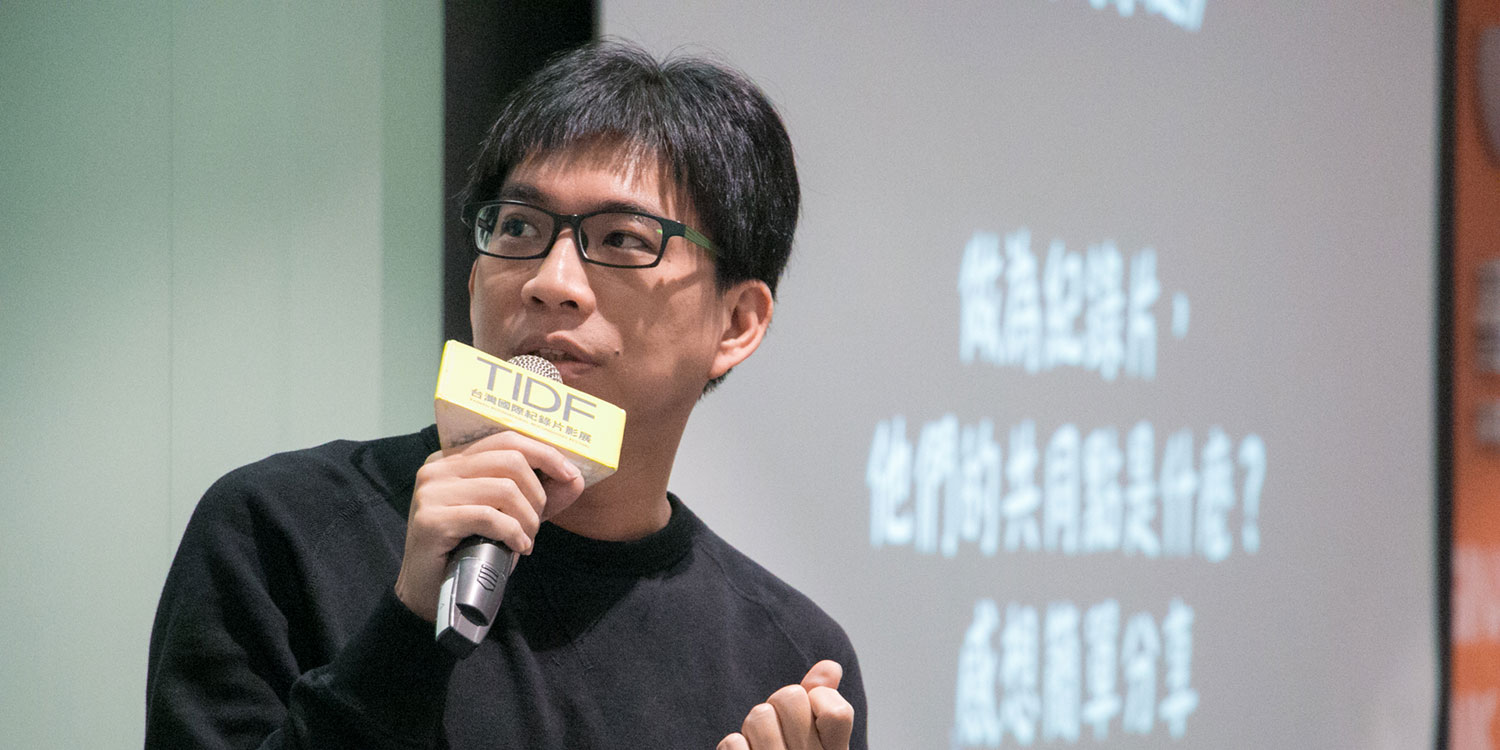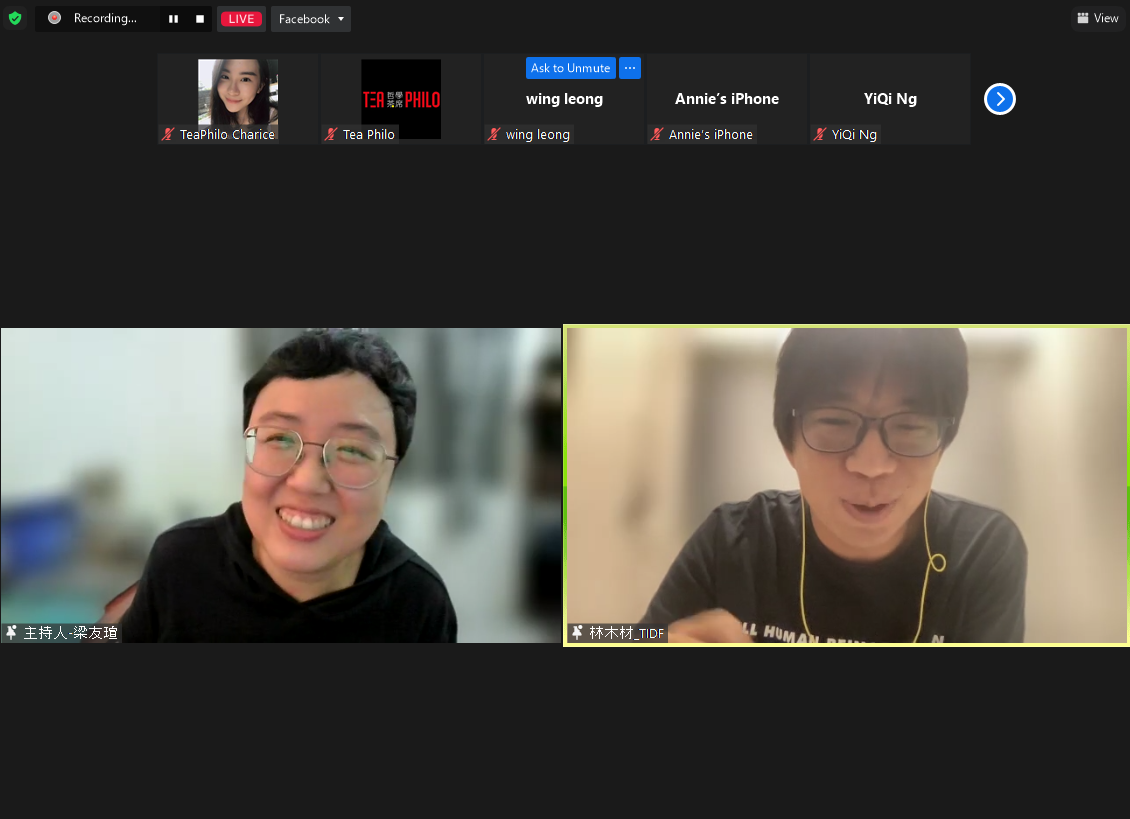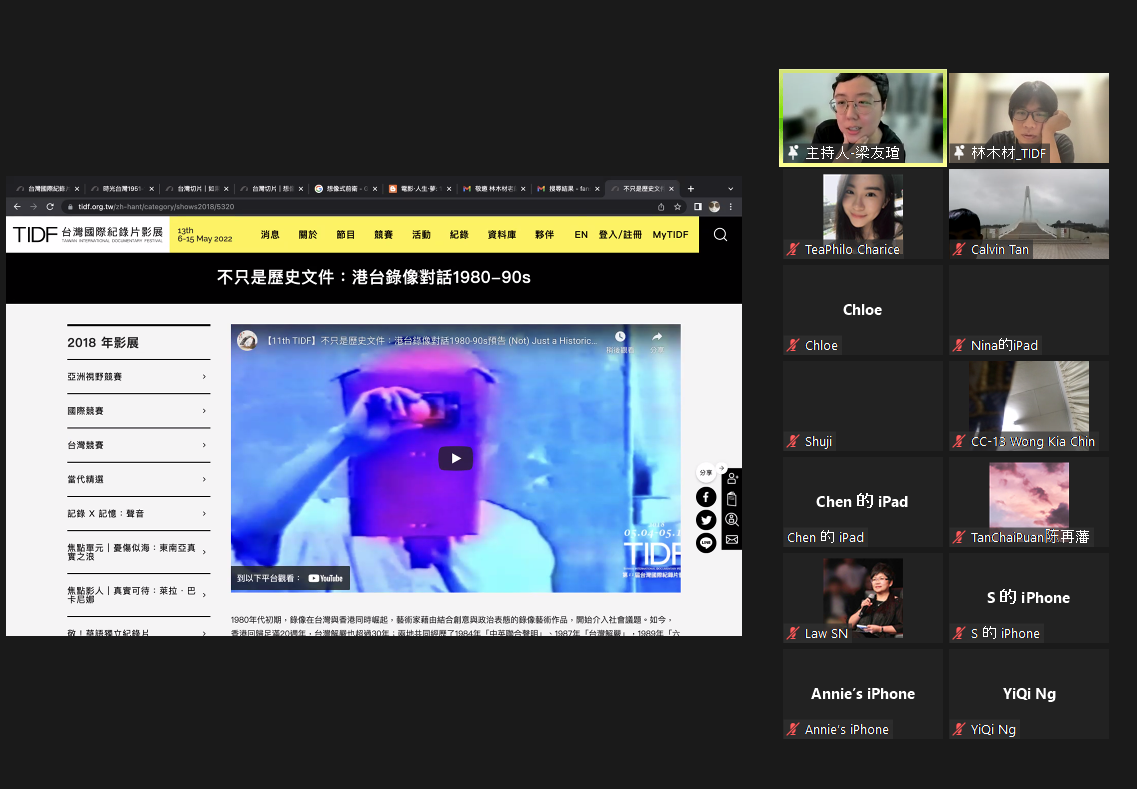Tea Philo 2022
How Film Curation can Response the Film History: Let's talk about Taiwan International Documentary Festival
【Tea Philo】54
Guest Speaker:
Wood LIN
Speaker Bio:
Wood LIN received his MA from the Graduate Institute of Sound and Image Studies at Tainan National University of the Arts. He is a filmmaker, film critic, writer, and festival organizer specializing in documentaries. He has served as program director of Taiwan International Documentary Festival (TIDF) since 2013 and now is the program advisor of International Documentary Festival Amsterdam (IDFA). He also served as a juror in many international film festivals, like DokuFest (Kosovo), Sheffield Doc/Fest(UK), Verite Cinema (Iran), Golden Horse Awards (Taipei), Hong Kong International Film Festival, and Taipei Film Festival and many others.
Theme of Discussion:
How Film Curation can Response the Film History: Let’s talk about Taiwan International Documentary Festival
Summary:
Organised by the Taipei Economic & Cultural Office in Malaysia and produced by INXO Arts & Culture (L) Foundation, Tea Philo is a series of sharing sessions revolving around the discussion of philosophies and humanities. Luminaries from Taiwan are invited to share their experiences and engage with the Malaysian audience to encourage exchanges of ideas and experience. The latest Tea Philo E-Talk session titled “How Film Curation Can Respond to Film History: Let’s talk about the Taiwan International Documentary Festival” featured guest speaker Wood LIN, the Programme Director of the Taiwan International Documentary Festival (TIDF). The talk was held in Mandarin and was moderated by LEONG Yew Sen, Lecturer at the Department of Drama and Visuals of New Era University College. The E-talk was broadcast via Zoom Meeting and Facebook Live on July 9th, 2022 and is available for rewatch on Tea Philo’s Facebook Page.
Wood Lin is a filmmaker, film critic and festival curator specialising in documentaries. He is currently the Programme Director of Taiwan International Documentary Festival (TIDF) and the Programme Advisor of International Documentary Festival Amsterdam (IDFA). Lin is also the director of the short documentary Liberty Square (2020).
During the talk, Wood Lin shared with the audience his approaches and experiences in curating thought-provoking programmes with historical depth and nuances, with TIDF as an example. Lin mentioned that upon being invited to give this talk, he had pondered the relevance between TIDF and the Malaysian cinema scene and audience. He hoped that what he shared could serve as a departure point for listeners to re-visit Malaysian films and try to watch and think about them from an additional perspective.
The Taiwan International Documentary Festival, TIDF, is a biennial festival that presents a well-curated programme of documentaries and includes public and educational programmes, such as Q&A sessions, workshops, and exhibitions. TIDF was founded in 1998 and has become one of the major professional platforms for documentaries in Asia and all around the world. It seeks out innovative documentaries with unique points of views relevant to social and human interests and encourages experimentation on and rethinking of the nature and aesthetics of documentaries.
Throughout Taiwanese film history, most of the films that have been discussed are well-known drama films. “Big names like Edward Yang and Hou Hsiao-hsien usually emerged from the drama genre. As the films got commercially distributed, they became shared memories for generations of moviegoers,” said Lin, “And because of the often realistic styles and themes, one can catch a glimpse of the development of Taiwanese history and culture through these films, making them the subject of most discussion in mainstream film history. The framework of how we discuss, categorise, and create narratives regarding commercial or mainstream films has thus become somewhat fixed in this context.”
“However, we know there is another system or context out there, that is documentary,” proposed Lin. “Documentaries might not have a very developed distribution system; nor do they usually have a high commercial value. But in certain ways, documentaries can be said to have more freedom in terms of creativity and perspectives exactly for the reason that they are not bound to the limitations and framework of commercial films. They can hold precious cultural value as well as limitless historical and creative possibilities,” said Lin.
Lin explained that the process of curating and planning for an edition of TIDF usually takes a whole year. TIDF features three competition sections (International Competition, Asian Vision Competition, and Taiwanese Competition), which call for films from all over the world, and several non-competition selections. The curatorial team will go through a long process of selecting topics, narrowing down scopes and directors to focus on, having thorough discussions, and eventually curating around 11 to 12 sections of programmes, including more than 130 films screened each year.
“Reel Taiwan” and “Taiwan Spectrum” are two acclaimed, recurring sections of TIDF devoted to in-depth exploration of documentary filmmaking in Taiwan. “Taiwan Spectrum” is a retrospective strand curated every year starting 2014. In each edition, the curatorial team chooses a new perspective from which one can approach and look into Taiwanese documentaries.
In 2016, TIDF presented a selection under “Taiwan Spectrum” with the topic “What’s the Colour for Documentary? The 30th Anniversary of Green Team” to celebrate the 30th Anniversary of Green Team, the first and the most important non-mainstream media in Taiwan. TIDF collaborated with Taiwan Green Team Documentary Film Association to organise a retrospective of their works, which document various social movements that have made a huge impact on the development of Taiwan’s democracy after 1986. According to curatorial notes, this retrospective is not only a search for the origin of modern Taiwanese documentary, but also an important attempt to understand the past and see the future.
This year, TIDF offered new editions of “Reel Taiwan” and “Taiwan Spectrum” with the respective topics “A Selected Series of The Portrait of Hundred Occupations (1986 – 1991)” and “Triviality that Speaks Volumes: Personal Cinema of Female Directors Since the 1990s.”
TIDF is always trying to seek out and make non-mainstream documentaries more visible and accessible to a wider audience. Lin mentioned that as a festival curator, he has to pay meticulous attention to every detail in the events and programmes. With over 200 screenings at TIDF, he has to engage and exchange ideas with every member in the team to figure out how to deliver and reveal the meaning of each film.
Lin also talked about his experience of evolving from a film lover who casually writes reviews of his favourite films to the curator he is today. “Malaysia, as a multicultural society, must have its intricate nuances that might be far beyond my comprehension as a Taiwanese. There must be challenges, conflicts or taboos, but I believe this is also where endless possibilities await. From my own experience, before we curated all these selections and programmes, most of these films might be deemed too niche or of little value; some might not even know they exist. As a curator, when you sense that there is a lack of something, it could be a gift in disguise, blessing you with a richer vision or imagination,” concluded Lin.
Host:
Leong Yew Sen (Senior Lecturer, Department of Drama & Visuals, New Era University College)
Date:
9th July 2022 (SAT)
Time:
8pm-9.30pm








